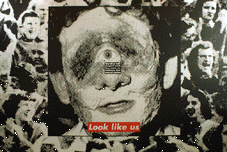Compelling 20th Century Artist:
Barber Kruger
By: Jennifer Ezeuka
Barber Kruger
was a much known female artist during the 20th century. In the 1980’s, it was very common to have a
“passive female object.” In other words,
the male continued to have this controlling position according to the camera. Many artists such as Barber Kruger
successfully changed this view in their work.
The 20th
century was a time period of change in the United States. With the rise of industries, technology, and
railroad networks, the price of labor became very cheap. “American people benefited from industrial
growth while also experiencing its adverse effects” (Marty, 1). The overall standard of living improved for
just about everyone. In terms of art,
the idea of realization appeared. The
idea that yes, the “truth” is impossible.
There was also many ways to look at things. As you’ll see, Barber Kruger’s work stood out
for its unique style.
Barber Kruger’s
subject matter is “blown-up, severely cropped photographs” (Chadwick, 382). She uses already existing photographs and
accompanies them with meaningful texts that convey a message. Many of the captions are rather deep and
towards current struggles and causes.
Her signature texts were black letters against a red background. A good example was in the piece titled: “Get
Out.” From my view, this piece tackles
the idea of abuse. It list examples,
then tells the viewer to get out and even includes a number to call. This in my opinion was a very powerful and
meaningful piece.
The medium
Barber Kruger used again is photographs already in existence. Most of the pictures were in black and white,
but a few did differ such as the piece titled “Heard.” I feel this medium successfully got Kruger’s
point across to the viewer easier, yet in a more powerful way. A lot of the images are very powerful, a good
example is the piece titled “look like us.”
It has a woman centered in the midst of many other people. The woman centered has only one eye and it
looks like her face was sculpted.
Puzzling, yet intriguing, this piece was very compelling and definitely
got her point across. Barber Kruger’s
earliest work dates back to 1969, but her peak was defiantly in the 80’s. In the 1980’s, Carter, Reagan, and Bush
senior were all presidents. Major events
during this time period include, the pope almost being assassinated, the first
woman appointed to the U.S Supreme Court, famine in Ethiopia, and many other
events. A lot of these events were
portrayed in Kruger’s work.
Barber Kruger’s
work had a lot of significance which have left a lasting influence on
contemporary artist. According to
Chadwick, “she emphasizes the ways in which language manipulated and undermines
the assumption of masculine control over language and viewing” (382). Barber Kruger was able to destabilize the
women’s position as objects. Like many
other artist, I feel Kruger paved the way for other artist by taking risks that
many others didn’t. She didn’t continue
to create art which continued the cycle of women as objects, but instead she
exposed it. Bringing it to light
influenced upcoming artist to take risks and to not be confined to certain
ideas when creating pieces. Most of
Kruger’s work dealt with feminism, classicism, consumerism, and individual
autonomy and desire. All of these
were/are current issues in history.
Barber Kruger was a very influential female artist during the 20th
century and in my opinion, of the best. Below are links showing more of Barber Kruger's work, ENJOY!!
Work Cited
Chadwick, Whitney. Women, Art, and Society. 3rd Edition. United Kingdom: Thames and Hudson Ltd., 1990.Twentieth Century: Society in the United States, Scholastic, Myron, Marty, 2012
http://www.scholastic.com/teachers/article/twentieth-century-society-united-states
The Art of Barber Kruger, 2003
http://www.barbarakruger.com/art.shtml
Barber Kruger: The Art History Archive,
http://www.arthistoryarchive.com/arthistory/feminist/Barbara-Kruger.html





No comments:
Post a Comment